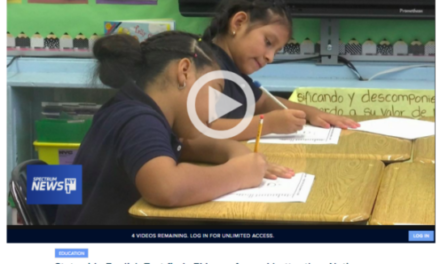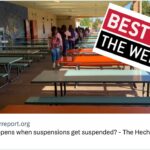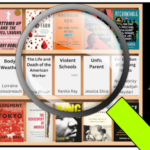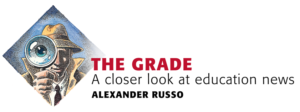
July wasn’t a great month for education journalism. Maybe it’s the summer heat, or vacation plans. Maybe it’s the distractions and outrages of the Trump administration (both real and media-inflamed). Maybe folks are saving their best stuff for August and September when teachers and parents of school-age children are most likely to be reading. But there was some good stuff, still — from the Washington Post, Vox, and others. Let’s check it out first:
THE BEST
VOX EXPLAINS SEGREGATION

Alvin Chang’s big school segregation piece stands out as one of the top pieces of the month. Titled School segregation didn’t go away. It just evolved, the Vox piece shows the dramatic increase in high-poverty/-minority schools over the past 17 years – roughly 70 percent – and explains many powerful dynamics that contribute to school segregation. The cartoon explainers are witty and effective at bringing readers to the heart of a complicated issue.
EMMY RECOGNITION FOR FRONTLINE DOCUMENTARY
It’s always good news when education-focused stories get recognized for the quality of their journalism, which is what happened when Frontline’s September 2016 documentary, “The Education of Omarina,” was nominated for an Emmy. I’m hoping to talk with producer/director Mary Robertson about the special challenges of making documentaries about education.
UNCOUNTED EXPULSIONS
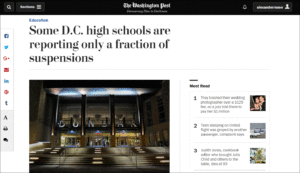
The Washington Post ran an important investigation showing that some D.C. high schools are reporting only a fraction of suspensions. The implications for the rest of the nation, where schools are also trying to replace suspensions with restorative justice, are clear. Are other districts hiding suspensions and expulsions? That remains to be seen. Meantime, read more about how the Post examined suspensions in D.C. schools here.
STUDENTS & TEACHERS
The fourth installment of new podcast series The Student Who Got Away features the author Tracy Kidder and the teacher Chris Zajac reflecting on a troubled student who was ultimately sent to an alternative school. We all have a favorite (or most reviled) teacher in our past. And those of us who have been teachers usually have strong memories of some of our students. (My first-year nemesis was a tall blonde kid named Pete Seeger, of all things – maybe I should look him up?) This series seems like a great way to engage a general audience, and I hope it continues.
ADDED DEPTH FROM NEW YORKER AND LA WEEKLY
Especially in these days of outrage and hyper-partisanship, pieces of journalism that address multiple angles or go a bit deeper are especially appreciated. Two examples from July include a New Yorker explainer covering DeVos’s “fraught attempt to address campus sexual assault” and the LA Weekly’s explainer of a big salary jump for LA school board members that includes huge pensions for three of the board members. It’s taking that extra step, looking for additional angles, that makes coverage stand out, and makes readers smarter.
FOLLOW-UPS
It’s nearly always interesting and helpful when journalists return to stories and characters from the past. In July, WNYC’s Yasmeen Khan returned to check in on Q, the transgender boy she reported on two years ago. In another fascinating follow-up, Cara Fitzpatrick of the Tampa Bay Times returned to one of the schools from Failure Factories to witness efforts to turn the school around with a new principal and some new approaches.
EMERSON PURCHASE OF THE ATLANTIC
Is it good news or bad for education journalism that the Emerson Collective, headed by Laurene Powell Jobs, is going to buy a big chunk of The Atlantic magazine (and eventually take it over)?
Past and present, Emerson has also supported writers such as Nikole Hannah-Jones, Amanda Ripley, and Richard Whitmire, and provided funding for Chalkbeat, the Marshall Project, the Teacher Project at Slate, as well as ProPublica IL.
Among many questions: How will the magazine cover innovation-focused initiatives like the XQ Prize, an Emerson-funded effort to reinvent the American high school experience? The folks behind the XQ Prize are ramping up for an announcement in a couple of months (September 8th, to be exact). Bigger questions include how will the purchase affect Atlantic coverage of reform-based approaches to improving schools in general?
Ever the pessimist, I’m going to say it’s good news for The Atlantic but bad for the outlet’s education coverage. For the LA Times, outside funding for education coverage from the Broad Foundation infused education news with more resources but at the cost of constant skepticism about whether the money was affecting coverage. Then again, the Gates Foundation’s support for NPR’s education team hasn’t generated the same level of concerns. Obviously, it will take time to see if and how The Atlantic’s education coverage is affected. [Both Gates and Broad are funders of The Grade.]
THE WORST
DEVOS OVERKILL

There were two more big DeVos profiles last month, one from The Guardian, the other from New York magazine. Both generated a brief spike of interest, as well as some criticism. Did either tell us anything new or important that we didn’t already know about the EdSec? Not that I saw. The only real benefit of the two pieces was the way they raised the issue of sexism when it comes to coverage of DeVos, which has long been a concern.
It’s understandable that outlets each want to do their own pieces about a hot-button topic like Betsy DeVos. And perhaps there are some number of readers who still rely solely on the outlets they subscribe to for information. But in an era of reduced resources – and a social media world in which coverage from different sources are all mixed together on Facebook and Twitter – the practice seems redundant and self-indulgent. At very least, it raises expectations that additional pieces being written should add value.
Meanwhile, DeVos’s first question-and-answer session with education reporters was a big disappointment, both in terms of how long the EdSec delayed talking to national education reporters and the substance of the session itself. All but one of the reporters in attendance complied with the department’s request that questions stay on a single topic (though to be fair, one reporter did find a creative way to link campus sexual assault to the Trump White House). Several folks who were there didn’t even get to ask a question. It’s going to take more than that to make access worthwhile.
POT CALLING KETTLE BLACK
Despite its excellent piece on uncounted suspensions (see above), The Washington Post’s story on principal turnover at a quarter of DCPS schools seems like it might overstate the turnover problem, lack context, and bury the progress being made there. While the Post asserts that there is a “pattern of upheaval” among a subset of DCPS schools, a 2014 EdWeek writeup notes research showing that a little more than a quarter of principals in high-poverty schools leave each year – much worse than what’s being reported about DCPS in the Post. And turnover is coming down dramatically, as the story notes later on: Ninety-two of the district’s 115 schools will have the same principal this fall they had last year.
Either way, a story focused on turnover can’t help but bring up the issue of turnover among Washington Post reporters who cover the city’s schools. In just a few years, the Post has gone through something like six DCPS reporters. The list includes Bill Turque, Emma Brown, Michael Chandler, Perry Stein, and Joe Heim. Alejandra Matos, who wrote the turnover piece, is now returning to Texas to work at another paper. Crossed fingers the rumored arrival of a new, permanent education editor – from Boston? – might help bring some stability and more coherence to the Post’s education team.
CORRECTIONS
Michigan’s The Bridge had to retract a feel-good story about a formerly homeless student getting into Harvard when it turned out that the whole thing was a hoax. (This happened in late June but is still worth mentioning.)
Meanwhile, The American Prospect published a story by freelancer Katherine Steward about school choice called “Proselytizers and Privatizers” but then took it down without explanation. Anyone know what’s going on? I got no response from the magazine or the author.
My recent piece about problems that seem to arise from asking education reporters to be political reporters lumped Politico in with the other national media outlets that ignored or under-covered the LA school board race and failed to give KPCC LA public radio credit for broadening its coverage beyond the narrow topics of charter schools and outside funding.
MERROW V. TOCH
At AlterNet, veteran education journalist John Merrow took former US News editor Tom Toch to task for a Washington Monthly piece on DC public schools, citing a number of problems with Toch’s story. Merrow was for many years the education correspondent for the PBS NewsHour, known for his tough reporting on Michelle Rhee and Eva Moskowitz. Toch recently launched a new project at Georgetown University, which hosted the latest EWA conference.
In essence, Merrow’s view is that Toch is guilty of writing a puff piece about DC public schools. And the Post’s story on fudged suspension rates among DC schools certainly raises suspicions that all is not so rosy improvement-wise. However, a quick re-reading of the original Toch piece suggests that it may not have been as much of a puff piece as it might have seemed at the time. I’m told that Toch is preparing a response, and that the Monthly is going to publish the back and forth.
WORST OF THE YEAR NOMINEES
None of the nominees for worst education journalism of 2016-2017 came from July, but the roundup was published during the month. The piece is a counterpart to the roundup of best education journalism of the year that came out in December. The “winners” will be announced later this month.
__
For last month’s roundup, go here.
For the weekly email newsletter, go here.
To find The Grade on Facebook, go here.
ABOUT THE AUTHOR

Alexander Russo
Alexander Russo is founder and editor of The Grade, an award-winning effort to help improve media coverage of education issues. He’s also a Spencer Education Journalism Fellowship winner and a book author. You can reach him at @alexanderrusso.
Visit their website at: https://the-grade.org/


